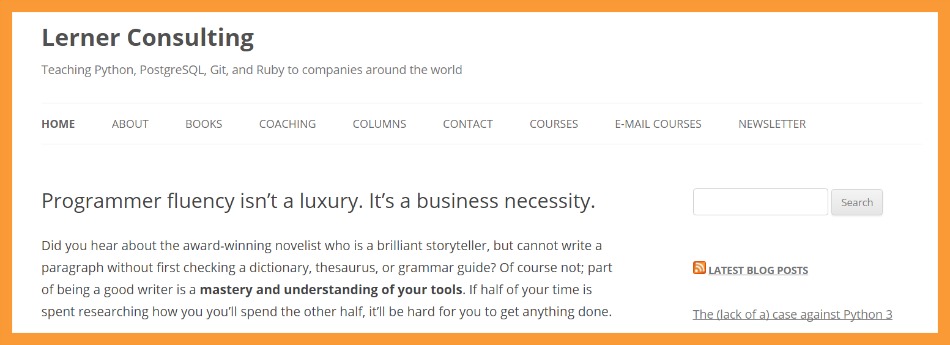We’re continuing to share a different story every few weeks of how a past student has been able to significantly grow their freelance business by applying the concepts they learned from Double Your Freelancing (check out the last one we did with Jeff Daigle).
If you feel your story would be a good fit, share why.
Reuven Lerner is also a man of many talents, including technical training (in Python, Git and PostgreSQL), web development, consulting, writing and more! No only that, he’s part-time CTO of TWO different companies — CauseMatch (which handles crowd-sourced fundraising for non-profits) and RLAC.
Read on to learn more about Reuven, his business and how it’s changed over the last few years.

Hi Reuven! Tell us about yourself – who are you and what do you for fun?
While I love software (and can spend oodles of time tinkering with programs and exploring the latest releases of my favorite languages), I have a number of other interests:
- My main obsession nowadays is learning Chinese, which is fun, practical (since I teach in China several times each year), constantly gives me insights into how my students feel and how I can help them to learn better. I’ve even turned my studies into a small side business, the Mandarin Weekly newsletter, which has about 7,000 subscribers.
- Besides that, I read a lot. I’m a huge news junkie, reading a number of intellectual elitist publications (New York Times, The New Yorker, the Economist and Ha’aretz). I don’t read much fiction, but do read quite a lot about history, economics, science and education. I’m also constantly listening to podcasts, thanks to the fact that I take public transportation to clients’ offices, as well as walk quite a bit.
- I also love to travel — I enjoy meeting people from different backgrounds, and exploring different languages and cultures. In the last six years, my family (including our three children) have visited five different European cities, which has been wonderful.
What got you into freelancing? Was it what you expected?
In 1995, I decided to move from the US to Israel. Israel’s high-tech boom was just starting, and I decided that maybe I would try out consulting — since in the worst-case scenario, I could likely find a job. I was working at Time Warner at the time, and my boss told me that if I went into consulting, he’d give me some projects.
And thus, Time Warner unwittingly became the seed investor in my consulting business.
On the one hand, it was totally different than I expected. I was (and still am) a financial ignoramus, and made all sorts of mistakes, handling as much of my work as possible to my accountant and his bookkeeping staff. On the other hand, I’ve been fortunate to have a steady stream of work coming in almost since I started.
Tell us about your hardest moment as an entrepreneur to date.
I thought that the only way a business could or should grow is by adding employees. After all, that’s what everyone else did, especially in the world of web consultants. So I hired a bunch of people (six in total), to work for me. This was in 1999, just before the bottom dropped out of the entire high-tech market. I went from having no problems paying the bills to laying people off, one at a time, and then struggling to repay the company’s debts.
It was very hard for me emotionally.
I was sure that I could get out of it, but there was a strong feeling that I had failed, and that my big dream of having a huge company was not going to happen. Now, it’s true that I made a ton of mistakes, and it’s true that I got out of that debt over time. But it’s also true that this forced me to rethink my attitude toward growing my business, and what I really want.
And what I really want is to be managing and selling relatively little, and doing a lot — which, as the head of an agency, would basically be impossible.
I have had several employees over the last decade, one at a time, doing day-to-day development for me. I find people who are totally amazing, want to work from home, are self-driven, who can speak with clients directly and with whom I get along.
I feel fortunate to have one such employee now, but I also know that one is enough. And I pay his salary based on the income he brings to the company, rather than a fixed monthly salary — a direct result of my problems in 2000. I’m happy to have a small company, and my dreams of having the “Lerner Consulting Towers” is now a distant memory.
On the flip side, what’s been your biggest success so far?
No question about it, the biggest success has been my decision to focus on training.
It has changed my life for the better, in a very dramatic way. I had always done some training, but it was probably about two years ago that I realized how much I enjoyed the training, and how it filled my pipeline so far in advance.
The only problem was that I was working through an agency at the time, which I knew was taking 50% of the money in the best of cases — and 90% (yes, ninety!) for open-enrollment courses at their facility. My decision to break off from them and work directly with companies as a trainer instantly doubled my daily income. Moreover, it has given me opportunities to teach in Europe, which pays far better than in Israel. And all of that has led me to start producing products and services for trainers, in a hyper-specialized version of what Brennan does for freelancers.
It’s really impossible to exaggerate the emotional relief and satisfaction of knowing that I have work lined up nearly every day, 5-6 months ahead of time and that such work will provide my family with a comfortable income. Already, we’ve managed to pay back almost all of my debts from my PhD, lots of back taxes and build an office for my wife in our backyard.
Best of all, we went on a two-week vacation this summer, and I was able to do almost no work during that time — something that my family noticed, and which increased our enjoyment together. I knew that even if I took two weeks off, we would have sufficient income to meet our expenses. It’s a game changer.
What were you struggling the most with when you ran into Brennan’s course?
Here’s the thing: By most measures, I wasn’t struggling. I had already been consulting for 15+ years, and had managed to feed my family, pay the mortgage and so forth. But I kept feeling like I wasn’t earning my potential. How could it be that I was so good at what I did, and yet wasn’t making the sort of money that I know many consultants do?
And yes, part of the problem was that I lived in Israel, where consultants are typically paid far, far less than in Europe and the US. But that didn’t explain all of it. Moreover, just about every time I’d tell people my rates, they would fall off their chairs in disbelief, shocked that I would try to charge $150/hour for my work.
And yet, I knew for a fact that consultants elsewhere were charging multiples of that.
I was thus looking for techniques to improve my business:
- To find better clients.
- To find clients willing to pay more.
- And to convince those clients (successfully) that paying me more was worthwhile.
What are some specific strategies, tactics or pieces of advice that helped you grow?
The two things to keep in mind are specialization and business value, not technical value.
Specialization is important. Really important. Just being another Rails developer will give you good income, but not amazing income. Positioning yourself as solving a business problem, for which they have a budget and/or interest, is crucial.
Even nowadays, if someone asks me to do development work, and I give a quote, they are shocked, because they’re comparing what I’m getting with what their software engineers (or managers, or CTO) are getting. But if I go in to do training and ask for that much (or more), it’s considered normal. The key is to specialize, and then to get your asking price compared with the problem, not with the staff members with whom you have so much in common.
While I do much less consulting and development than used to be the case, I do still take on some such work. And twice so far, roadmapping has led to big wins. I’m still new at it, but I now see how a day-long meeting with a client, followed by the write up of a 12-14 page document, gives you instant credibility with the client.
I used to think that I gave detailed and good price proposals, but those don’t hold a candle to the roadmaps I create. And I can charge them for what I’m doing, also!
What are you most excited about for your business in 2017?
Well, I’m already scheduled through February of 2017, and I’m writing this in September of 2016. So the rest of my year is looking good.
That said, I’m revamping my trainer coaching program, and have created a free Facebook group for tech trainers, so that we can get to know each other and help each other. It excites me to know that I’m helping other trainers, and that I might be able to turn my combined passions for technology, education and business into a sideline that provides others with similar satisfaction with their work.
I also hope to (finally) produce and sell recorded versions of the Python courses I teach at Fortune 100 companies. There’s a great deal of potential in those sales, but they’ll only happen when I finally record those videos.
The other thing that excites me is a new topic (data science + machine learning) that I have started to teach. And just as I was fortunate to be teaching Python at a time when interest was growing, I think that this is a topic that is growing so fast, and for which there is such demand, that I feel I’m again in the right place at the right time.
 Reuven offers training in Python, Git, PostgreSQL, and data science to companies around the world. He has been developing Web applications since 1993, has had his own consulting business since 1995, and has been a Linux Journal columnist since 1996. In 2014, Reuven finished his PhD in Learning Sciences from Northwestern University. Reuven is also the part-time CTO of several companies, most notably “Rent Like a Champion,” which appeared on Shark Tank in late 2015. Reuven is the author of
Reuven offers training in Python, Git, PostgreSQL, and data science to companies around the world. He has been developing Web applications since 1993, has had his own consulting business since 1995, and has been a Linux Journal columnist since 1996. In 2014, Reuven finished his PhD in Learning Sciences from Northwestern University. Reuven is also the part-time CTO of several companies, most notably “Rent Like a Champion,” which appeared on Shark Tank in late 2015. Reuven is the author of
several books, most recently “Practice Makes Python” and “Practice Makes Regexp,” and is currently working on products and services for technical trainers. Reuven is a permanent panelist on (and sometimes host of) the Freelancers Show podcast. He lives with his wife and three children in Modi’in, Israel.